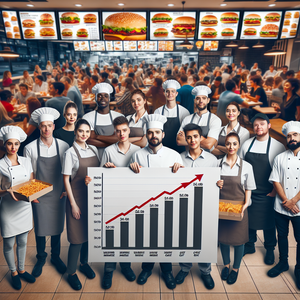The Future of Fast Food: How McDonald's is Adapting to a Changing World

Sustainability has emerged as a critical concern for consumers and businesses alike. The impact of climate change on food production, coupled with heightened consumer awareness about environmental issues, has prompted fast-food brands to rethink their operational practices. McDonald's has recognized the importance of sustainability and has made substantial commitments to mitigate its environmental footprint. For example, McDonald's has pledged to source 100% of its coffee, palm oil, and fish from sustainable sources. This commitment not only supports responsible farming and fishing practices but also caters to the growing consumer demand for ethically sourced products. Furthermore, McDonald's is actively working to reduce greenhouse gas emissions across its supply chain. A key component of this initiative includes transitioning to eco-friendly packaging, with a goal of ensuring that all packaging materials are recyclable, compostable, or made from renewable resources by 2025. By prioritizing sustainability, McDonald's is positioning itself as a responsible leader in the fast-food sector, demonstrating that profitability and environmental stewardship can go hand in hand.
The Plant-Based Revolution
In recent years, there has been a notable shift towards plant-based diets, driven by health concerns and environmental considerations. As more consumers identify as vegetarians, vegans, or flexitarians, fast-food chains are adapting their menus to meet this demand. McDonald's has taken significant steps in this direction by introducing the McPlant burger, developed in partnership with Beyond Meat. This meat alternative was launched in select markets and aims to attract those seeking flavorful, meatless options without compromising their dietary choices. The introduction of plant-based items not only reflects changing consumer preferences but also addresses the environmental challenges associated with meat production. The meat industry is a significant contributor to greenhouse gas emissions, and by diversifying its menu to include plant-based options, McDonald's is appealing to a broader audience while contributing to more sustainable food practices. This strategic move positions McDonald's as an inclusive brand that recognizes and responds to the evolving dietary preferences of its customers.
Technological Advancements
The integration of technology into the fast-food experience has revolutionized how consumers interact with brands. With the rise of mobile ordering and delivery services, convenience has become a top priority for customers. McDonald's has responded to this trend by investing in its mobile app, which allows users to place orders in advance, customize their meals, and access special promotions. This not only enhances the customer experience but also streamlines operations for the company. Additionally, McDonald's has partnered with major delivery platforms such as Uber Eats and DoorDash, catering to the growing demand for food delivery services. The introduction of touchscreen kiosks in restaurants further improves the ordering process, enabling customers to browse the menu at their leisure and avoid long wait times. By leveraging technology, McDonald's is not only meeting the expectations of modern consumers but also enhancing overall customer satisfaction in an increasingly fast-paced world.
As the fast-food industry undergoes unprecedented changes, McDonald's is exemplifying resilience and adaptability in the face of new challenges. Through its commitment to sustainability, the introduction of plant-based options, and the integration of technology into its operations, the brand is strategically positioning itself to thrive in a dynamic environment. By actively listening to consumer demands and responding with innovative solutions, McDonald's is not just keeping pace with industry trends; it is actively shaping the future of fast food. As we look to the future, it will be intriguing to observe how the Golden Arches continue to evolve, further aligning with the needs and preferences of a changing world.
Sustainability Coordinator
Large food chains, retail companies, and non-profit organizations
Core Responsibilities
Develop and implement sustainability initiatives focused on waste reduction, energy efficiency, and sustainable sourcing.
Collaborate with suppliers and internal teams to ensure compliance with environmental regulations and sustainability goals.
Conduct audits and assessments to measure the effectiveness of sustainability programs and report findings to management.
Required Skills
Strong understanding of environmental science and sustainability practices.
Excellent project management skills and ability to work cross-functionally.
Experience with data analysis and reporting tools.
Menu Development Specialist (Plant-Based Focus)
Fast-food chains, health food brands, and food manufacturing companies
Core Responsibilities
Research and develop new plant-based menu items that align with consumer trends and dietary preferences.
Collaborate with culinary teams to ensure product quality, taste, and nutritional standards are met.
Conduct market analysis to identify competitive offerings and consumer feedback for continuous improvement.
Required Skills
Strong culinary background with a focus on plant-based nutrition.
Creative thinking and passion for innovative food solutions.
Experience in product testing and sensory evaluation.
Digital Marketing Manager (Fast Food Sector)
Fast-food chains, marketing agencies, and consumer brands
Core Responsibilities
Develop and execute digital marketing strategies to promote new product launches and brand initiatives.
Analyze consumer data and market trends to optimize advertising campaigns across various digital platforms.
Manage social media presence and engage with customers to enhance brand loyalty and awareness.
Required Skills
Proficiency in digital marketing tools and analytics platforms (e.g., Google Analytics, social media insights).
Strong communication and creative skills for content creation and audience engagement.
Experience with SEO, PPC, and email marketing strategies.
Technology Integration Specialist (Quick Service Restaurants)
Fast-food chains, technology providers for the food industry, and restaurant management companies
Core Responsibilities
Oversee the implementation of technology solutions such as mobile ordering systems, kiosks, and delivery platforms in restaurant locations.
Work closely with IT and operations teams to troubleshoot issues and provide training to staff on new technologies.
Monitor system performance and customer feedback to ensure optimal user experience.
Required Skills
Technical proficiency in point-of-sale (POS) systems and restaurant management software.
Strong problem-solving skills and ability to work in a fast-paced environment.
Experience in project management and stakeholder communication.
Supply Chain Analyst (Sustainability Focus)
Food manufacturers, retail chains, and sustainability-focused consultancies
Core Responsibilities
Analyze supply chain processes to ensure sustainable sourcing and compliance with ethical standards.
Collaborate with suppliers to track and improve sustainability metrics across the supply chain.
Prepare reports and presentations for management on supply chain performance and sustainability initiatives.
Required Skills
Strong analytical skills with experience in supply chain management software.
Knowledge of sustainability certifications and practices in food sourcing.
Excellent communication and collaboration skills for engaging with various stakeholders.


